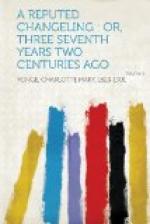So the uncle and niece entered on their new life, with some loss of independence, and to the Doctor a greater loss in the neighbourhood of the Cathedral and its library; for after the first year or two, as Lady Archfield grew rheumatic, and Sir Philip had his old friend to play backgammon and read the Weekly Gazette, they became unwilling to make the move to Winchester, and generally stayed at home all the winter.
Before this, however, Princess Anne had been at the King’s House at Winchester for a short time; and Lady Archfield paid due respects to her, with Anne in attendance. With the royal faculty of remembering everybody, the Princess recognised her namesake, gave her hand to be kissed, and was extremely gracious. She was at the moment in the height of a quarrel with her sister, and far from delighted with the present regime. She sent for Miss Woodford, and, to Anne’s surprise, laughed over her own escape from the Cockpit, adding, “You would not come, child. You were in the right on’t. There’s no gratitude among them! Had I known how I should be served I would never have stirred a foot! So ’twas you that carried off the child! Tell me what he is like.”
And she extracted by questions all that Anne could tell her of the life at St. Germain, and the appearance of her little half-brother. It was impossible to tell whether she asked from affectionate remorse or gossiping interest, but she ended by inquiring whether her father’s god-daughter were content with her position, or desired one—if there were a vacancy—in her own household, where she might get a good husband.
Anne declined courteously and respectfully, and was forced to hint at an engagement which she could not divulge. She had heard Charles’s expressions of delight at the arrangement which gave his boy to her tender care, warming her heart.
Lady Archfield had fits of talking of finding a good husband for Anne Woodford among the Cathedral clergy, but the maiden was so necessary to her, and so entirely a mother to little Philip, that she soon let the idea drop. Perhaps it was periodically revived, when, about three times a year, there arrived a letter from Charles. He wrote in good spirits, evidently enjoying his campaigns, and with no lack of pleasant companions, English, Scotch, and Irish Jacobites, with whom he lived in warm friendship and wholesome emulation. He won promotion, and the county Member actually came out of his way to tell Sir Philip what he had heard from the Imperial ambassador of young Archfield’s distinguished services at the battle of Salankamen, only regretting that he was not fighting under King William’s colours. Little Philip pranced about cutting off Turks’ heads in the form of poppies, ‘like papa,’ for whose safety Anne taught him to pray night and morning.
Pride in his son’s exploits was a compensation to the father, who declared them to be better than vegetating over the sheepfolds, like Robert Oakshott, or than idling at Portsmouth, like Sedley Archfield.




